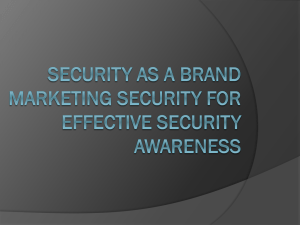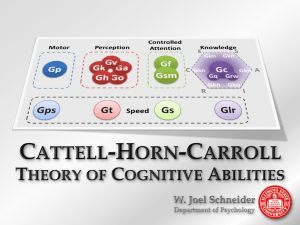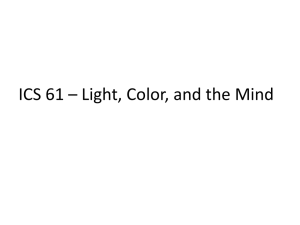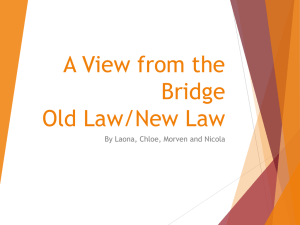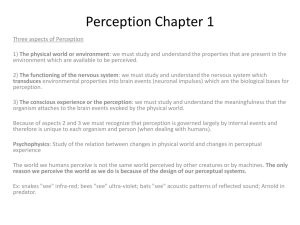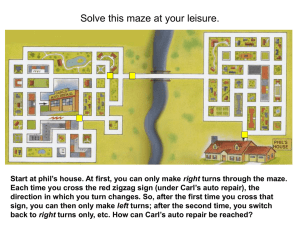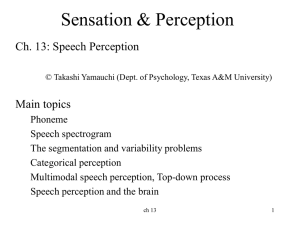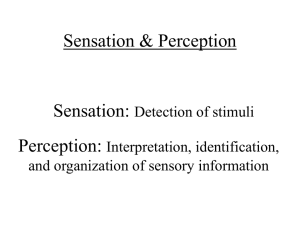Dónal Rice, presentation, powerpoint , opens in
advertisement
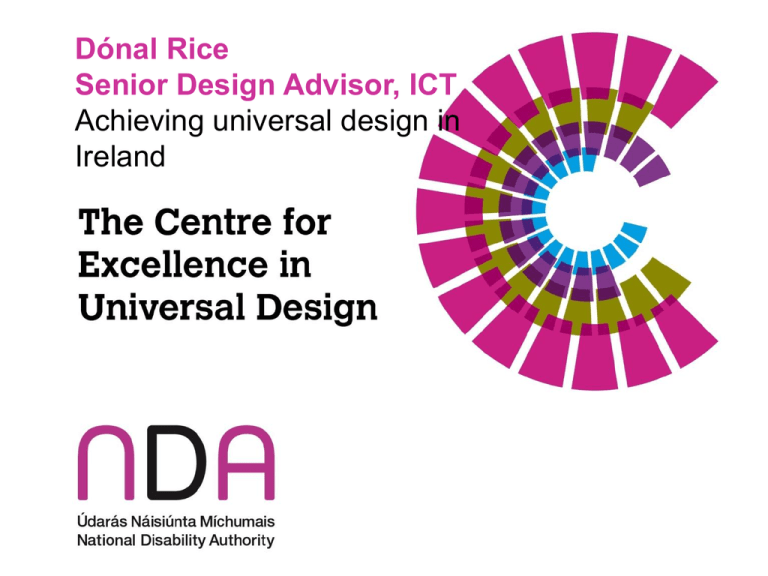
Dónal Rice Senior Design Advisor, ICT Achieving universal design in Ireland Centre For Excellence in Universal Design (CEUD) Standards – Stimulate research – Participate in Standardisation work nationally and internationally – Provide advice to stakeholders – Encourage compliance Education and Professional Development – Incorporate UD content into design curriculum – Guidance on Universal Design for teaching, examinations and accreditation Awareness – Maintain a best practice database (website) – Promote awareness and understanding Universal Design Assumes; Every person experiences barriers, reduced functioning, some form of disability – temporary or permanent – at some stage in life Ireland’s National Disability Strategy launched in September 2004 Disability Act 2005 Formation of; Centre for Excellence in Universal Design (CEUD) January 2007 Built environment Products & Services ICT 3 Age Technology and Older People • Universal Design and Technology for Older People • A Survey Tool for Assessing Technology Design for Older People, in-situ, in an Irish Context • St James Hospital and TCD • Pendant alarms and other ‘difficult technologies’ Technology and Older People • Mostly unsure or unaware of what steps would occur after they had pressed the alarm button. • Understanding that batteries needed to be replaced from time to time on the alarms • Understanding that the alarms would not work outside a radius of the home • Buttons on tape recorders or DVDs that were the same colour as the casing, and were very small and difficult to see • Symbols on controls that were difficult to understand • Difficulty in operating equipment due to reduced mobility and dexterity, for example reaching down to operate a DVD player placed at a low level relative to the ground. Technology and Older People • Universal Design Survey tool – applied in the homes of 30 older people in the Liberties Area in Dublin 8. All were over 65 years of age and most live alone. – Draft tool based on work of e.g. Lenker and Beecher – 3 pilots of Tool – capable of generating quantitative scoring of the relative difficulties the users had, and capturing qualitative data on the design issues with which users struggled. – designed to be of use to a usability expert and an engineer with design experience. Technology and Older People •“Dramatic reading” at Activage Seminar •Inspired by work of Alan Newell/Maggie Morgan http://www.universaldesign.ie/AGEING Size Size Data for Universal Design in Ireland (Anthropometry Research, Penn State, USA) http://www.universaldesign.ie/SIZE Ability In-Home Displays Guidance http://www.universaldesign.ie/INHOMEDISPLAYS Lived experience of people using public sector websites • Research and guidance The research question • What are the experiences of Irish people in using Irish public sector websites, and what are the practical implications regarding Universal Design for website managers? 1. Literature review Review of other sources of data e.g. MeAC Analysis of NDA data 2. Expert eval Review of other literature sources Literature review and initial key themes and issues needing clarification AMAS business audit (usability) Site audits (DIT?) accessibil ity Data from website managers 3. Consultation Consultation: End users and their representatives CONSULTATION Public sector web managers User testing Key themes and issues validated Key themes and issues identified in detail Final report and Recommend ations Research: key findings • Initial interviews with some 1,300 people about their experience of these sites – a relatively low rate of usage (52%) of public service websites – ostensibly due to “lack of interest” particularly among groups who would benefit most from well designed websites – over 80% [n=679] of users reported no difficulty in using these sites • Persons with disabilities 3 times more likely to encounter a difficulty Research: key findings • • • • • Huge diversity in how people in Ireland access and use the Web today presents new challenges for public sector organisations in terms of accessibility and usability For those who do not use public sector sites, “lack of interest” type responses may mask a wide range of issues, from accessibility perceptions to a lack of relevance. While most respondents say they have no difficulty in using these sites, a substantial number report problems for fundamental tasks such as making applications online and finding out about entitlements Self-assessment by site owners may give an overly positive picture and downplay the problems of "churn" – where websites that achieve a certain level of accessibility in one year are unable to sustain this subsequently Online provision of public services offers considerable benefits for government and society. There is a clear business case for applying Universal Design principles and practices in delivering these services online. In particular, planning UD into a site's development has a much lower cost than "retrofitting“ Hundreds of thousands of people in Ireland have conditions that may hamper Web usability, and application of better design will improve website usability for all users. The Guidance http://www.universaldesign.ie/WEB Universal Design for Customer Engagement in Tourism Services This Irish Standard presents guidance for the use of Universal Designs to improve the engagement between tourism services providers and their customers, in: 1) Electronic based communications 2) Written communications 3) Telephone communications 4) Face to face communications http://www.universaldesign.ie/TOURISM Disability MEASURES TO IMPROVE ACCESSIBILITY OF PUBLIC WEBSITES IN EUROPE Funka Nu AB WRC Empirica Content of the study • Accessibility assessment of websites • Interview with webowners • Stakeholder involvement Services to check • • • • • Income taxes Job search by labour offices Social security benefits Public libraries Enrolment in third level of University education • Health related services Meaningful accessibility • • • • • Navigation, tab and focus. Documents: pdf or word Forms Basic technical construction Multimedia Report • Current status on accessibility • Efforts/costs of achieving accessibility • Monitoring and reporting issues • Commentary on prepardness of MS for Directive 3 3 3 1 EDUCATION Universal Design 2nd Level Irish Education Pilot Designing our Tomorrow (DOT) (Cambridge, UK) Universal Design Grand Challenge Student Awards 2014 • 29th May 2014 – UDGC People’s Choice Award – Travelling perpetual trophy • €1,000.00 in prize money (€500 for the school plus €500 for the designer(s) – UDGC Judges’ Choice Award 2014 Trophy – Travelling perpetual trophy • €1,000.00 in prize money (€500 for the school plus €500 for the designer(s) • http://www.universaldesign.ie/grandchallenge Meet the Normals Diversity is normal Grandma Betty Normal Mom Mary Normal Dad Harry Normal Daughter Susie Normal Son Johnny Normal Baby PJ Normal Universal Design Process Motivation Unit A Process Unit B Evaluation Unit C Diversity Unit D Case Studies Unit E Motivation Process Evaluation Diversity Case Studies Equitable Use Myself and Others Universal Design Process Thinking Creatively Flexibility & Simplicity Perception & Error Effort & Space Perception Cognition Action Case Studies Equitable Use Myself and Others Universal Design Process Thinking Creatively Flexibility & Simplicity Perception & Error Effort & Space Perception Cognition Action Case Studies Week 6 Week 7 Week 8 Week 9 Case Studies Case Studies Week 5 Perception Cognition Action Week 4 Flexibility & Simplicity Perception & Error Effort & Space Week 3 Universal Design Process Thinking Creatively Week 2 Equitable Use Myself and Others Week 1 Week 10 Week 11 Week 12 Week 6 Week 7 Week 8 Week 9 Case Studies Case Studies Week 5 Perception Cognition Action Week 4 Flexibility & Simplicity Perception & Error Effort & Space Week 3 Universal Design Process Thinking Creatively Week 2 Equitable Use Myself and Others Week 1 Week 10 Week 11 Week 12 Week 6 Week 7 Week 8 Week 9 The Normal Family Case Studies Case Studies Week 5 Perception Cognition Action Week 4 Flexibility & Simplicity Perception & Error Effort & Space Week 3 Universal Design Process Thinking Creatively Week 2 Equitable Use Myself and Others Week 1 Week 10 Week 11 Week 12 Week 6 Week 7 Week 8 Case Studies Week 9 The Normal Family Case Studies Case Studies Week 5 Perception Cognition Action Week 4 Flexibility & Simplicity Perception & Error Effort & Space Week 3 Universal Design Process Thinking Creatively Week 2 Equitable Use Myself and Others Week 1 Week 10 Week 11 Week 12 Week 6 Week 7 Week 8 Case Studies Design Project Week 9 The Normal Family Case Studies Case Studies Week 5 Perception Cognition Action Week 4 Flexibility & Simplicity Perception & Error Effort & Space Week 3 Universal Design Process Thinking Creatively Week 2 Equitable Use Myself and Others Week 1 Week 10 Week 11 Week 12 Project Report.pdf Instructor Guide.pdf The Design Project Sample Project Discover.ppt Develop.ppt Description Define.ppt Deliver.ppt Motivation Process Evaluation Diversity Case Studies Equitable Use UD Process Flexibility & Simplicity Perception Product Perception & Error Cognition Built Environment Myself & Others Creative Thinking Effort & Space Action ICT Introduction.ppt Introduction.ppt Introduction.ppt Introduction.ppt Introduction.ppt Equitable Use UD Process Flexibility & Simplicity Perception Product Perception & Error Cognition Built Environment Myself & Others Creative Thinking Effort & Space Action ICT Learning Activities Learning Activities Learning Activities Learning Activities Learning Activities In Class In Class In Class Take Home In Class Take Home In Class Take Home Take Home Take Home Royal Institute of Architects Ireland Annual Architecture Awards 2013 1st Universal Design Award sponsored by Centre for Excellence in Universal Design Winner (and also Peoples Choice Award) – UCD Student Centre Institute of Designers in Ireland Universal Design Award
